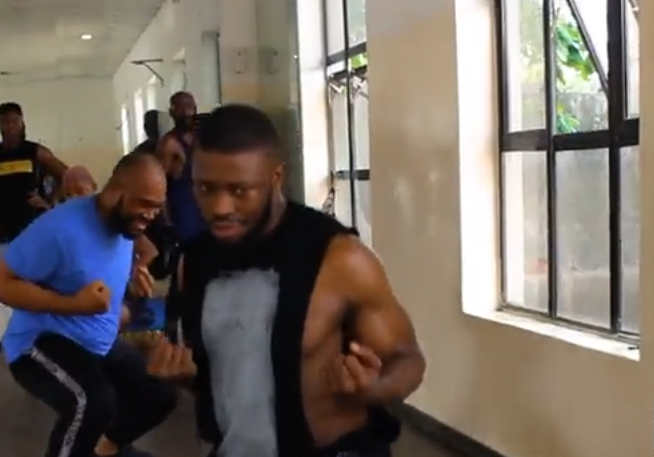He struts onto the red carpet holding hands with his wife Blessing Obasi and the cameras go flashy. Stan Nze, this time, wore an oxblood suit that exuded formality, away from his seeming inclination to doing an all-native style. His wife, on the other hand, is glistening in her black one-slit sequined dress.
It’s the red carpet premiere for the second film in the crime drama franchise ‘The Set Up’. The scenery is teeming with presenters, actors, and film executives in a frenzy of activities that preceded a viewing of the movie. TheCable’s Stephen Kenechi accosts Nze to broach a discourse about the actor’s place in the film which is expected to hit cinemas on August 12.
‘The Set Up 1’, the film’s prequel, followed the story of a former drug smuggler who got more than she bargained for after a businessman hired her to assist in his scheme of marrying a wealthy heiress. Things take an ugly turn as she realises there is more to the scheme than meets the eye. ‘The Set-Up 2’, the sequel, is however set four years after.
Nze, in this interview, shares his experience filming his fight scenes to play the role of a quirky secret service agent.
The actor also lends his voice to talks and concerns about Nollywood’s possibly shrinking cinema market share.

Stephen Kenechi: You weren’t exactly in the prequel of this film. Talk to me about what the experience was for you with character interpretation on the set for the sequel.
Stan Nze: ‘The Set-Up’ is one of the biggest franchises in Nollywood, if you’d agree with me. Of course, I was not in the first one but I totally enjoyed it as a viewer. I’d been looking forward to, maybe not a sequel. But it’s here.
Being a part of it has been a privilege. Inkblot is one of the big studios here. So you wouldn’t expect anything less than pure entertainment, having brought us ‘The Wedding Party’ and ‘The Arbitration. This is their franchise.
“For my character, I play Agent Obiora, who worked with the secret service agency with Adesua’s character Chike who had just returned to the country. We’re supposed to solve some cases and I try to make sure this is sorted.
Not to give too much away, my character is the life of a party; the guy who has a bit of skoi-skoi (quirks). It was fun.
Stephen Kenechi: So what would you consider the most challenging character trait for you playing that?
Stan Nze: (cuts in) Having to fight! I mean, it’s the first film I’m really doing that I had to train for fights. I had to really shoot my fight sequences. Because it is choreographed, sometimes you’re worried about hitting people.
I’ve had cases where we actually really hit people. I’ve had times when people hit me as well. And my mouth is swelling. That, in itself, is very challenging because it’s not something we’re used to.
We’re sort of gradually getting into it. I can’t wait to see some of those scenes to observe how it plays up on-screen.
Stephen Kenechi: The film aside now, there’s been some talk recently about Nollywood’s shrinking cinema market share, so to speak. I wonder what your commentary would be on this.
Stan Nze: More avenues are opening for more people to see our films. Some watch online. Of course, we can’t over flog the idea that the cinema share thing is still very important. People still need to see films on the big screen.

Cinema is an experience you can never get on mobile or TV. It’s still something that cannot go out of extinction. For Nollywood as a whole, it’s still a win-win. There are more avenues to show our films which are now everywhere.
This is unlike the time when we all had to wait for the cinemas to see these films. It’s a win-win for us. It might not be bringing so much money to the cinemas right now. But, looking at it holistically, it’s a win.
Stephen Kenechi: So you’re saying it’s not necessarily something film executives should worry about?
Stan Nze: Because the goal in Nollywood is to get more people to watch us. People who have that cinema culture inculcated in them still have it. It’s only easier to convince someone to watch a film online than go to the cinema.
We have to be open to change and hope that we will be able to have more community cinemas where people can have direct and closer access, as against traveling several minutes to access one.
Copyright 2025 TheCable. All rights reserved. This material, and other digital content on this website, may not be reproduced, published, broadcast, rewritten or redistributed in whole or in part without prior express written permission from TheCable.
Follow us on twitter @Thecablestyle

